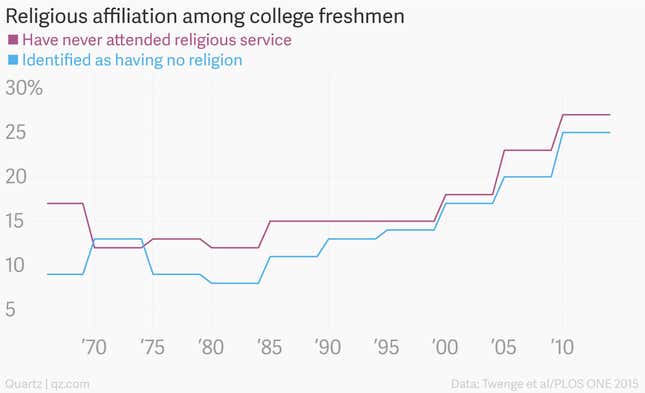American millennials—those born between 1982 and 1999—are less likely to identify as religious than previous generations at the same age, according to a new analysis of a combined large survey.
Researchers analyzed survey data from more than 11 million respondents, consisting of everyone from eighth graders to college-goers in the period between 1966 and 2014. The analysis, published in the journal PLOS One, reveals that even though the majority of adolescents still identify as religious in some way, a growing number is identifying as having no religion.
The trend begins to appear in 2000, when the first millennials began answering some of these surveys. Of the college students who started in 1970, for example, 12% said they never attended religious services, whereas today as many as 27% say that. College students who identified as having no religion have increased from 13% to 25% in the same time period.

According to Jean Twenge, a professor of psychology at San Diego University and lead author of the study, this is one of the first long-term studies that connects a trend to a specific generation. Though short-term survey results can help give a snapshot of trends at a time, they don’t show trends that may affect entire generations.
“If you want to look at generational differences, you have to make sure to take age out of the equation,” she tells Quartz. By looking at surveys of young adults in three different generations—the baby boomers, generation X, and millennials—the team ensured that they accounted for age.
Though the survey results can only show correlation, and not causation, Twenge thinks that this generational shift is likely a result of a rise of individualism.
“Individualism can be an uncomfortable fit with religion,” she says. Whereas religion typically emphasizes social norms and appeals to a higher authority, individualism focuses on the self and personal choices.
The need to belong hasn’t changed. What has changed is how people fulfill it. Now there’s the option to turn to things like Facebook, for example, rather than an external religious group, to find a community.
Of those who identified as having no religious affiliation, the decline was the highest among women, Caucasians, young adults living in a lower socioeconomic status, and those living in the northeastern US. Religious affiliation for African Americans and those who identified as politically conservative declined the least across the different generations.
